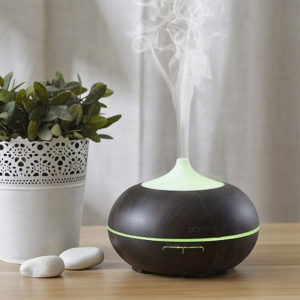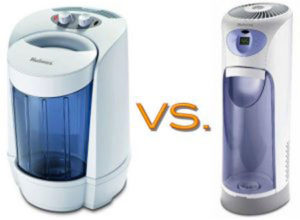
In lines with the Centers for Disease Control and Prevention, one in thirteen people suffers from asthma. More specifically, approximately 26 million Americans have asthma. Essentially, these statistics are definitely worrying, as more and more children are affected by this condition. However, did you know that the cold weather can actually worsen the severity of this disease? Why is that?
For one thing, the cold and dry air could mean havoc for asthma sufferers. Another major contributing risk factor is the increased incidence of sinus and upper respiratory infections. These elements might either trigger or worsen the severity of the asthma attacks – which leads us to our topic today: is a humidifier good for asthma? This article aims at answering this question, clarifying whether there is such a thing as the best humidifier for asthma or not.
ARE HUMIDIFIERS BENEFICIAL FOR ASTHMA SUFFERERS OR NOT?
Yes – a humidifier can soothe the symptoms associated with this condition. We’ll explain why. Asthma is a condition that affects more than one part of the breathing system.
This is, specifically, why experiencing an unexpected flare-up can be really dangerous. The constriction of the breathing muscles, together with the thickened phlegm and the inflamed airways will prevent one from breathing. Hence, in the case of extremely severe attacks, one might be literally incapable of breathing accordingly.
But what are the primary elements that could trigger asthma attacks? We cannot be 100 percent certain regarding the cause of this widespread condition. That’s primarily because the causes of asthma depend on every person. With that in mind, there are still some common triggers we’ll briefly present in the upcoming paragraphs.
-
ALLERGIES
First of all, it appears that approximately 80 percent of the people suffering from asthma also have allergies. These allergies are really diverse, and they can be to grass, trees, mold, weed, pollens, dust mites, animal dander, cockroach particles and so on. Essentially, health specialists recommend people suffering from allergies to point out the factors that could trigger the allergic reaction. Concurrently, investing in a humidifier for allergies could help.
-
SINUSITIS AND OTHER UPPER RESPIRATORY INFECTIONS
Moving on, just as asthma leads to the inflammation of the lining of the airway, sinusitis determines the inflammation in the mucous membranes that line the sinuses. Due to this inflammation, the mucous membranes will secrete more mucus.
This is why it’s essential to treat sinusitis or prevent it so that it doesn’t aggravate into asthma.
-
EXPOSURE TO IRRITANTS
There are numerous irritants that could either worsen or trigger the appearance of asthma. More specifically, irritants such as the smoke from wood-burning appliances, tobacco smoke, strong odors from cleaning agents, perfumes, and the list may go on.
-
COLD AIR AND UNEXPECTED CHANGES IN TEMPERATURE AND HUMIDITY
People suffering from asthma are already used to noticing how their symptoms change with the weather. So, what is it about cold weather that makes it aggravate the severity of this widespread condition?
When the cold air enters the airways, this could make them go into spasms, triggering common asthma symptoms such as wheezing, coughing, shortness of breath, as well as tightness in the chest. At the same time, when the temperatures are lower, the incidence of flu and other sinus infections is much more widespread, which can further cause discomfort – as we discussed above.
That isn’t to say that a high humidity level could be beneficial for asthmatics. As a matter of fact, there are dangers if the humidity levels are higher than normal, as well. To be more specific, some people experience a worsening of their symptoms when the weather is too damp. This is why you should be careful, in this respect.
HOW CAN A HUMIDIFIER HELP WITH ASTHMA?
 For one thing, it’s important to monitor the humidity levels inside your house. Only after doing that can you determine whether you need to invest in a humidifier or not. The area in which you live will play a part in this respect, as well.
For one thing, it’s important to monitor the humidity levels inside your house. Only after doing that can you determine whether you need to invest in a humidifier or not. The area in which you live will play a part in this respect, as well.
For example, in the case in which the humidity level inside your house is below 30 percent – which is likely to happen during the cold season, then you might consider getting a humidifier.
Additionally, bear in mind that it is critical to monitor the humidity level at all times. More specifically, if the humidity level goes over 50 percent, then you should shut the unit off. That’s because, when the humidity level is higher than 50 percent, this is likely to encourage the spread and development of bacteria, mites, and mold. As we discussed above, these are common asthma triggers, which is why you should be very careful in this view.
So, to summarize, low humidity levels are associated with irritated nasal passages, dry skin, dry throat, and itchy eyes. Meanwhile, high humidity levels (higher than normal) will make your house stuffy and, in some cases, cause condensation on the walls and other surfaces. Over the course of time, this leads to the growth of detrimental bacteria, mold and dust mites. These harmful allergens are really dangerous, especially to asthmatics. This is why you should maintain a balanced humidity level – somewhere between 30 and 50 percent.
As long as you take this into consideration, a humidifier can offer relief. That’s because it aims at easing the discomfort of dry lips, dry throat, dry nose, and dry skin. At the same time, a humidifier makes breathing much more comfortable.
The reason why many people use this appliance is that it contributes to loosening the mucus in the chest and throat. Simultaneously, it’s worth mentioning that a humidifier releases moist air. This is highly efficient in the sense that it keeps the airways free – in a natural way. While many asthmatics turn to over-the-counter medications and nasal sprays, which can open the airways, these are linked with a bunch of side effects, as well.
-
MAKE SURE YOU MEASURE THE HUMIDITY LEVEL
So, how do you measure the humidity level inside your house to ensure that it isn’t too low or too high? The most reliable item for this is the hygrometer. This device measures the humidity inside your house and lets you know when you must shut down the humidifier.
WHAT TYPE OF HUMIDIFIER IS BETTER FOR ASTHMA: A COOL MIST HUMIDIFIER OR A WARM MIST HUMIDIFIER?
 Moving on, when browsing for the best humidifier for your needs, you will find out that there are numerous types of humidifiers on the market. One way of categorizing them is by dividing them into cool mist humidifiers and warm mist humidifiers.
Moving on, when browsing for the best humidifier for your needs, you will find out that there are numerous types of humidifiers on the market. One way of categorizing them is by dividing them into cool mist humidifiers and warm mist humidifiers.
For one thing, both cool mist and warm mist humidifiers offer relief for allergy and asthma sufferers. Nonetheless, they operate quite differently. With that in mind, we’d like to enumerate the main benefits and disadvantages associated with each individual category.
-
WARM MIST HUMIDIFIERS
A warm mist humidifier heats water in order to produce warm mist. In essence, this type of humidifier functions with warm water, as the name already entails, meaning that it has the potential of restricting the growth and spread of mold and bacteria in the parts of the humidifier where they are likely to appear. This is why most people opt for them.
On a different note, bear in mind that warm mist humidifiers also collect the minerals that are left from the heated water. Simultaneously, warm mist humidifiers usually don’t come with filters. Thus, they are easier to maintain – which could make them more appealing from this point of view.
Pros
- If a room is cold, it can slightly make it warmer.
- Available in portable sizes.
- It has a quiet operation, which makes it suitable for light sleepers – if intended to be used at night.
Cons
- It isn’t advisable for houses with children. That’s because the water inside gets at boiling temperature. Therefore, if a child were to get in contact with the humidifier, it could lead to unwanted accidents.
- They require cleaning maintenance – but this applies to both categories.
- Due to the heat, warm mist humidifiers utilize more energy than their counterparts.
- The warm, humid air might be uncomfortable for sensitive asthma patients.
-
COOL MIST HUMIDIFIERS
Now let’s focus our attention on cool mist humidifiers. As the name suggests, such a unit is structured to disperse cool mist. When it is delivered in the air, it is already at room temperature. There are several types of cool mist humidifiers. For example, cool mist ultrasonic humidifiers are much quieter than the evaporative humidifier, as they work differently.
In addition to that, the minerals that are collected and afterward delivered in ultrasonic humidifiers are prone to become white dust. This will eventually reach your furniture, curtains, and so on.
However, this white dust can be prevented by utilizing distilled water.
Pros
- Available in portable sizes.
- More affordable than warm mist humidifiers.
- Recommended for houses with children.
- They don’t use as much electricity as their counterparts.
- The cool air might be more soothing to asthma sufferers that react negatively to moist, hot air.
Cons
- Cool mist humidifiers are likely to accumulate bacteria and mold, requiring attentive and regular cleaning.
- If you purchase an evaporative humidifier, you have to replace the filter on a regular basis.
So, which one is better for asthma sufferers? Should you look for a warm mist humidifier or a cool mist humidifier?
For the most part, this is entirely up to you, as there are contradicting opinions on the topic. Some believe that there is no difference between the two when it comes to soothing the effects of asthma – namely excessive nasal and throat dryness, eye itchiness, and so on.
That’s because the moisture released by a cool mist humidifier immediately alters its temperature as it is delivered in the air. The same can be said about the moisture released by warm mist humidifiers. However, some people are overly sensitive, meaning that they might experience negative reactions in contact with warm, humid air.
Source: https://www.humidityexpert.org/best-humidifier-for-asthma/





